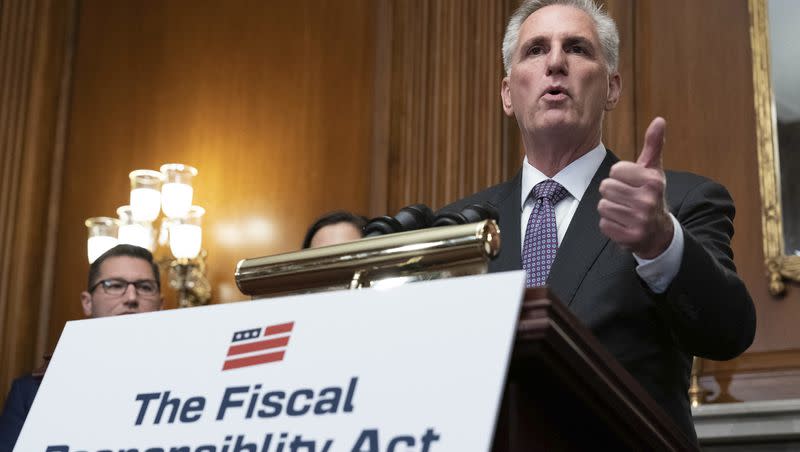Here’s how Utah’s 4 congressmen voted on the debt ceiling bill

- Oops!Something went wrong.Please try again later.
All four of Utah’s Republican congressmen voted in favor of the Fiscal Responsibility Act on Wednesday night, sending the debt ceiling deal to the Senate.
Earlier in the day, their fellow Utah Republican, Sen. Mike Lee, spoke against the bill on the Senate floor, calling it a “bad deal for America.”
Utah’s congressmen touted the bill as a vehicle for reduced spending, and for slowing the increase in the amount of debt owed by the federal government, which stands at $31 trillion.
“When I ran for Congress, I committed to use my role in congress to reverse Washington’s dangerous debt culture. Tonight, I will vote for the Fiscal Responsibility Act, a significant step toward reversing our federal spending trajectory,” said Rep. Blake Moore, who represents Utah’s 1st District.
Moore said there was “much more work to be done” but called the bill “historic.”
“Did we get everything we wanted out of this deal? Of course not,” he said. “That’s the reality of divided government. House Republicans will continue to fight for spending cuts and conservative policies, but the provisions in this legislation are a win for Utahns, and they will put us in the position to achieve more success in the future.”
Rep. Burgess Owens of the 2nd District said in a tweet the bill “slows the growth of Washington.”
“The Fiscal Responsibility Act, the largest deficit reduction in American history, restores economic sanity in the People’s House,” Owens said. “While it doesn’t include everything @HouseGOP fought for, this compromise stops Washington’s spending habits from bankrupting our kids and grandkids.”
His thoughts were echoed by Rep. John Curtis of the 3rd District, who called the measure the most “consequential spending reduction bill in more than a decade.”
“Since coming to Congress, I have not voted for a single omnibus spending bill or debt ceiling increase,” Curtis said in a press release after the vote. “While not perfect, this is the first bill I have been presented that gets Washington to spend less than it did last year and move towards balancing our budget.”
Rep. Chris Stewart, of the 4th District, who earlier in the day announced he would resign from the House, also voted in favor of the bill.
Lee criticizes bill during Senate floor speech
The deal still faces an uncertain future in the Senate. While it will likely come up for a vote, it could be stalled by senators who are opposed to it.
This includes Lee, who criticized the bill in a speech on the floor of the Senate on Wednesday and said he would vote against it. He said the deal doesn’t produce the savings promised by McCarthy.
He has previously said he would use “every procedural tool” possible to delay passage of the bill.
Lee called the negotiated agreement a “palliative pill” and a “bad deal for America.” He said the promised $1.5 trillion in savings were “almost entirely illusory.”
Lee was a fan of the Limit, Save, Grow Act, the original Republican debt ceiling bill, which restricted spending and offered several spending reforms. It also contained the REINS Act, which would give Congress the power to review some rules made by federal agencies before they took effect.
But many of those reforms and spending cuts were stripped out of the deal during negotiations between Biden’s White House and a team of lawmakers put together by House Speaker Kevin McCarthy, R-Calif.
Lee said some of the reforms, like a “pay-as-you-go” provision, were toothless.
“The regulatory pay-go measure means nothing. It is worth no more than the paper it is printed on. Less than that in fact,” he said.
“This deal begs the question, with Republicans like these, who needs Democrats? We deserve better,” he said.
Lee said the deal was a “fake response to burdensome debt,” which is at almost $32 trillion currently and could go up to $36 trillion under this agreement, he said.

